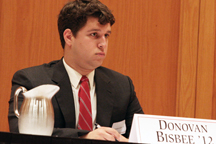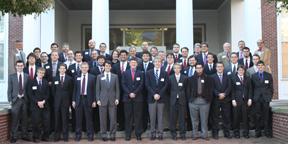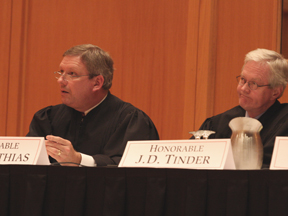The 18th Annual Wabash College Moot Court competition ends with tonight's final round argued before a panel of prestigious judges. This year's topic is the constitutionality of the new healthcare law. The Finals Round will be argued at 7:30 p.m. in Salter Hall in the fine Arts Center.
Student advocates for the Finals Round include Petitioners Tim Markey ’12 and Andrew Dettmer ’15 and Respondents Steve Henke ’12 and Michael Carper ’13. Last year's champion, Donovan Bisbee, is the First Alternate. This year’s Moot Court problem involves the constitutionality of the Patient Protection and Affordable Health Care Act’s requirement that individuals must purchase health insurance. Specifically, does that requirement violate the Constitution’s “Commerce Clause” permitting Congress to regulate interstate commerce?
 Moot Court is just one aspect of Law Week at Wabash, which begins Monday. Alumnus Frederick Whitmer, a partner at the New York City office of Kilpatrick Townsend & Stockton LLP, will present a lecture on Wednesday entitled, “Arming Yourself for the Litigation Battlefield: the Liberal Arts Education as Ammunition” in Hays Hall 104.
Moot Court is just one aspect of Law Week at Wabash, which begins Monday. Alumnus Frederick Whitmer, a partner at the New York City office of Kilpatrick Townsend & Stockton LLP, will present a lecture on Wednesday entitled, “Arming Yourself for the Litigation Battlefield: the Liberal Arts Education as Ammunition” in Hays Hall 104.
Read more about this year’s Moot Court case.
This year's Moot Court will be available for viewing via live stream video.
“As usual, the problem was drafted by Rick Pitts ’83,” said Rhetoric Professor Todd McDorman, who coordinates the on-campus competition. “Rick had to really work at this one since there are more than 20 different cases involving the constitutionality of the health care act. He waded through more than 800 pages of decisions to construct a problem that reflects the complexities of the health care law and yet is concise and focused in a way fitting for our undergraduate competition.”
The problem is primarily drawn from two Circuit Court of Appeals Decisions—Thomas More Law Center v. Obama (6th Circuit) and State of Florida v. Department of Health and Human Services (11th Circuit).
 Thirty-two students began the competition on Saturday with approximately 20 alumni attorneys and two faculty members assisting in the judging. The competitors are a mix of veteran participants and newcomers; nine participants made the 12-person semi-finals last year. There are also nine freshmen in this year’s Moot Court.
Thirty-two students began the competition on Saturday with approximately 20 alumni attorneys and two faculty members assisting in the judging. The competitors are a mix of veteran participants and newcomers; nine participants made the 12-person semi-finals last year. There are also nine freshmen in this year’s Moot Court.
While McDorman manages the on-campus coordination, he’s assisted by a cadre of Wabash attorneys, including Scott Himsel ’85 (also a visiting assistant professor of political science), Matt Griffith ’89, Jon Pactor ’71, Pitts ’83, Brad Johnson ’71, and Seamus Boyce ’03.
The alumni coordinators encourage student participation, recruit alumni and finals round judges, write the annual problem, and support the program in other ways. The competition is co-sponsored by the IAWM and the Rhetoric Department
In Moot Court, teams of two students represent the litigants of the case. In this instance, two students will represent the petitioners who are challenging the legitimacy of the health care law and two other students will represent the United States in advocating on behalf of the law’s constitutionality. The student advocates are peppered with questions from alumni and faculty who serve as the appellate judges during the competition.
In the preliminary rounds of the competition each student will argue in two rounds, once on each side of the issue. Twelve students will then advance to semi-finals on Monday and four will compete in the finals Tuesday evening.
 The Finals Round judges include the Honorable Edward W. Najam, Jr. of the Indiana Court of Appeals, the Honorable Elaine B. Brown of the Indiana Court of Appeals, Frederick L. Whitmer ’69, who is a partner in the New York City office of the international law firm Kilpatrick Townsend & Stockton, and Wabash Professor of Economics Frank Howland, who is teaching a Health Care Economics course this semester.
The Finals Round judges include the Honorable Edward W. Najam, Jr. of the Indiana Court of Appeals, the Honorable Elaine B. Brown of the Indiana Court of Appeals, Frederick L. Whitmer ’69, who is a partner in the New York City office of the international law firm Kilpatrick Townsend & Stockton, and Wabash Professor of Economics Frank Howland, who is teaching a Health Care Economics course this semester.
“The Wabash College Moot Court is a wonderfully challenging competition that pushes our students and builds relationships among students, alumni, and faculty,” said McDorman.